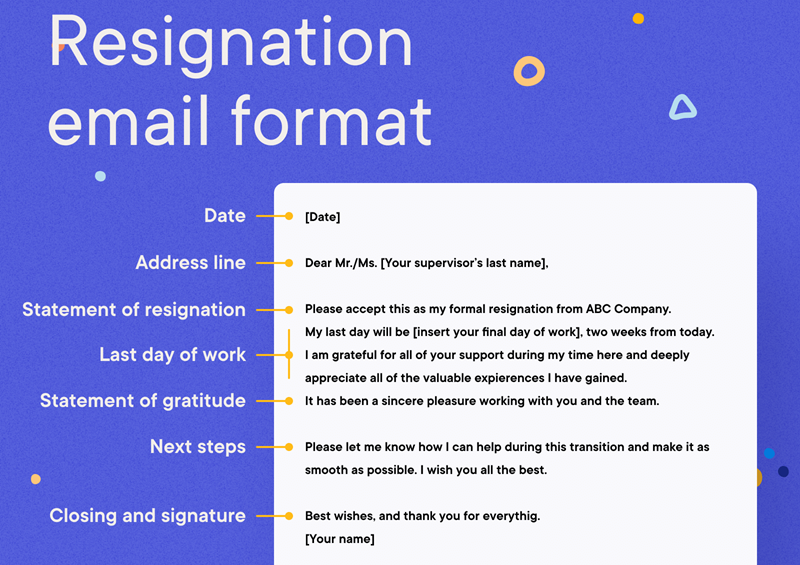Leaving a job gracefully involves more than just giving notice. It’s about leaving a lasting impression. How do you write a resignation letter that maintains positive relationships while avoiding any awkward or burnt bridges?
Your resignation email serves as the official record of your departure and sets the tone for your final days with the company. It’s an opportunity to express gratitude for the opportunities you’ve had, outline your transition plan, and reflect on your time with the organization. By carefully choosing your words and structuring your message thoughtfully, you can ensure that your departure is remembered for your professionalism and integrity.
Navigating the emotions and logistics of leaving a job can be challenging, but a well-crafted resignation email can ease the transition for both you and your colleagues. Whether you’re moving on to new opportunities or navigating a challenging departure, learn the essential elements of how to write an email that leaves a positive legacy in your wake.
Table Of Contents:
- How to Write a Resignation Email
- Tips for Writing a Professional Resignation Letter
- What Not to Write in Your Email Resignation
- Informing Your Manager and HR Department
- Prepare for Your Transition
- Resignation Email Templates
- FAQs: How to Write a Resignation Email
- Conclusion
How to Write a Resignation Email
So, you’ve decided to move on from your current job. Congrats. But before you can start your new adventure, there’s one last thing you need to do: write a professional resignation email.
I know, it can feel a bit awkward and uncomfortable. But trust me, as someone who’s been there before, a well-crafted resignation email is crucial for leaving on good terms and maintaining positive relationships with your soon-to-be former employer.
What to Include in Your Resignation Email
First things first, let’s talk about what you should include in your resignation email.
While resignation letters are highly personal, they all have these key components:
- Statement of Resignation: Begin your email by clearly stating that you are resigning from your position. Make it explicit and avoid any ambiguity.
- Notice Period: Specify the date of your last working day and adhere to the notice resignation period as required by your employment contract or company policy. This allows your employer to plan for your departure and ensures a smooth transition.
- Expression of Gratitude: Express gratitude for the opportunities you’ve had and the experiences gained during your time with the company. Acknowledge the support and mentorship you’ve received from colleagues and supervisors.
- Brief Reason (Optional): While not always necessary, you can include a brief explanation for your resignation if you feel comfortable sharing. Keep it positive and professional, focusing on personal growth or career advancement.
- Transition Assistance: Offer to help with the transition process by training your replacement, documenting your tasks and responsibilities, or providing any necessary handover materials. This demonstrates your commitment to ensuring a seamless transition for your team.
- Contact Information: Provide your contact information, such as your personal email address or phone number, in case your colleagues need to reach you after you’ve left the company.
- Closing Remarks: End your email on a positive note, expressing your best wishes for the company’s continued success and thanking your colleagues once again for their support.
Tips for Writing a Professional Resignation Letter
First, let’s talk about the all-important email subject line in your resignation letter. It’s the first thing that your boss will see when you turn in your notice.
I recommend something straightforward like “Resignation – [Your Name]” or “Notice of Resignation.” They might not be the most exciting subject lines, but they get the job done.
Maintain a Professional Tone
Resignation emails can be a delicate dance. Even if you can’t wait to leave your job behind, maintain a cordial tone.
Keep your language polite, respectful, and free of any negative comments about the company or your coworkers.
You never know when you might cross paths with them again in the future.
Provide Adequate Notice
One of the most important aspects of a professional resignation email is giving your employer sufficient notice. It’s not just a courtesy; it’s often a requirement.
Most companies require the standard weeks’ notice but check your employee handbook to be sure. Some companies may require more time, especially for higher-level positions.
I once worked for a company that required a full month’s notice for senior roles. Imagine the awkwardness if I had left with just a two-week heads up. Avoid that uncomfortable situation by knowing your company’s expectations.
Thank Your Employer
What sticks with you after your time with the company? Is it the skills you’ve honed, the wise advisors who’ve guided you, or the enduring bonds you’ve formed with coworkers?
In your email, express your sincere thanks for these opportunities. A little gratitude goes a long way in leaving a positive lasting impression.
Highlight Positive Experiences
When saying thanks, be sure to spotlight the high points — like that game-changing project or the major milestone you crushed.
Say thanks to your boss by highlighting your achievements — it’s a win-win that strengthens your bond and reminds them of the undeniable value you bring to the table.
Keep Doors Open for Future Opportunities
You never know where your career path may lead you in the future. That’s why it’s so important to maintain good relationships with your former employers and colleagues.
By expressing your gratitude, highlighting positive experiences, and keeping the lines of communication open, you’ll be setting yourself up for success in your future career endeavors.
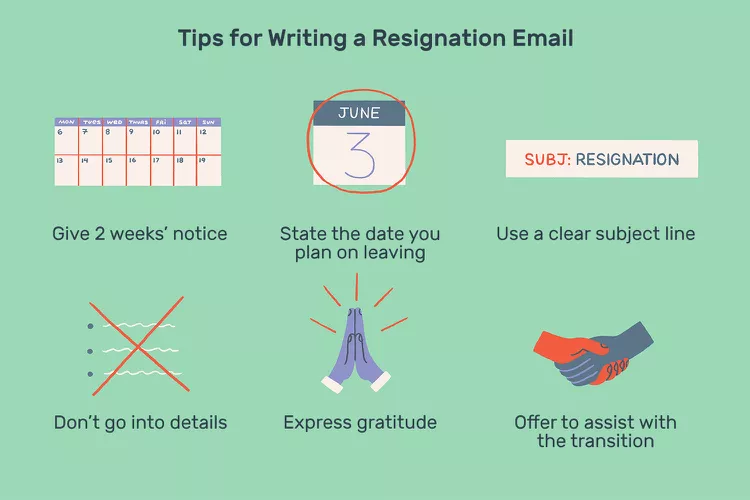
What Not to Write in Your Email Resignation
When drafting a notice resignation letter, it’s crucial to maintain professionalism and positivity, even if you’re leaving under less-than-ideal circumstances. The focus should be on succinctly communicating your departure while preserving the relationships you’ve built.
Here are several elements you should avoid writing in your resignation notice letter:
- Negative Comments: Regardless of any challenges you faced during your tenure, refrain from airing grievances or criticizing colleagues and company practices in your resignation letter. This maintains professionalism and leaves doors open for future opportunities.
- Too Much Detail About Your Next Job: While it’s natural to feel excited about a new role, oversharing details can come across as insensitive or boastful. A simple mention that you are moving on to pursue other opportunities suffices.
- Detailed Criticism of Your Old Job: Avoid listing aspects of the job or company culture that were unsatisfactory. Such critiques are better suited for an exit interview if HR asks you for feedback.
- Jokes or Sarcasm: Humor can easily be misinterpreted in written form; what may seem like light-hearted jest could offend someone or undermine the seriousness of your decision to leave.
In addition to these points, it’s also wise not to use this communication as a platform for venting frustrations. Remember, this letter will become part of your permanent employee record and could influence future references.
Informing Your Manager and HR Department
When you’re ready to put in your resignation, the first step is to notify your direct supervisor. This should be done in person if possible, but if not, a phone call or video chat will do.
I remember when I resigned from my first job out of college, I was so nervous to tell my boss but I knew it was the right move for my career. I scheduled a meeting with her and just laid it all out there. She was understanding and even offered to be a reference for me in the future.
During the meeting with your supervisor, formally notify them of your decision to leave the company. Be prepared to discuss your reasons for leaving and your planned last day. Keep the conversation professional and positive, focusing on the opportunities you’ve had and the growth you’ve experienced.
After notifying your supervisor, it’s crucial to loop in your company’s HR department. They’ll need a copy of your formal resignation letter for your personnel file and can guide you through the offboarding process.
I suggest sending a brief email to your HR representative with your resignation letter attached.
For example:
Dear Ms. Johnson,
Please find attached my formal letter of resignation. I’ve informed my supervisor, John Smith, of my decision. My last day will be [date]. Please let me know the next steps in the offboarding process.
Thank you, [Your Name]
Prepare for Your Transition
Once you’ve notified the right people, it’s time to start preparing for your actual departure. You want to leave on a high note and make the transition as smooth as possible for your team.
Organize Your Files and Projects
Start by organizing all your work files and projects. Make sure everything is clearly labeled and easy to find. I like to create a master document with an overview of my responsibilities, key contacts, and any important deadlines or milestones coming up.
If you’re in the middle of any major projects, schedule a meeting with your supervisor and relevant team members to discuss the status and next steps. Offer to create a transition plan outlining how to complete the project after you leave.
Train Your Replacement
Making your exit as smooth as possible? Offer to train your replacement. Get them up to speed with some good old-fashioned knowledge sharing, guided walkthroughs, or a simple chat about what the role demands.
When I resigned from my last job, I spent my final two weeks creating detailed how-to guides for all my daily tasks and responsibilities. I wanted to ensure a smooth transition for whoever took over my position. It was a lot of work, but I knew it would make the transition smoother for my team and reflect well on me.
Even if they don’t hire your replacement before your last day, make yourself available to answer questions or provide clarity after you leave. This shows a level of professionalism and dedication that can leave a lasting positive impression.
Resignation Email Templates
When the time comes to move on from your current position, knowing how to write a resignation email can be a big help.
Whether you’re leaving for a new opportunity or due to unforeseen circumstances, it’s important to communicate your departure in a manner that maintains relationships and respects the company’s procedures.
Don’t know how to format an email? Below are three resignation email templates designed for different scenarios, ensuring you leave on good terms.
Template 1: Standard Notice
If you’re transitioning out of your role with notice, this template helps convey appreciation while informing your employer of your decision:
Dear [Supervisor’s Name], I’m writing to resign from my position as [Your Job Title] at [Company Name]. My last working day will be [date], complying with the required notice period. I appreciate all the opportunities I’ve had here and am grateful for everything I've learned during my tenure. Over the next few weeks, I'm committed to ensuring a smooth transition by completing outstanding tasks and assisting in training other team members if needed. Thank you once again for the opportunity. Best regards, [Your Name]
Template 2: Immediate Resignation
Sometimes situations arise requiring immediate departure. This template addresses such instances respectfully:
Dear [Supervisor’s Name], Regrettably, I must inform you of my decision to resign effective immediately due to personal reasons which prevent me from continuing in my role as [Your Job Title]. This was not an easy decision and happened under circumstances beyond my control. Please know that it has been a pleasure working with everyone at [Company Name]. I understand this may cause inconvenience; thus, I am willing to assist remotely where possible during this transition period. Sincerely, [Your Name]
Template 3: Career Advancement Departure
This template is perfect when leaving for another job offer that aligns better with career goals:
Dear [Supervisor’s Name], It is with mixed emotions that I announce my resignation from my current position as [Your Job Title], effective two weeks from today. An exciting new opportunity has come up that will significantly help in achieving long-term career goals. Please accept this letter as formal notification of my resignation from [Company name]. Working here has been incredibly rewarding experience. During these final two weeks, please let me know how best can support any transitions work necessary. Warmest regards, [YourName]
Remember, these are just resignation letter examples. Feel free to customize them to fit your specific situation and company culture.
Don’t have a clue how to start your letter? Find tips in this blog post on how to start a professional email.
If you’re pressed for time, you can ask AIMEE to write a resignation email for you. AIMEE is our resident chatbot that’s trained to write any type of copy — yes even resignation letters!
Here are some examples of letters I asked AIMEE to compose:
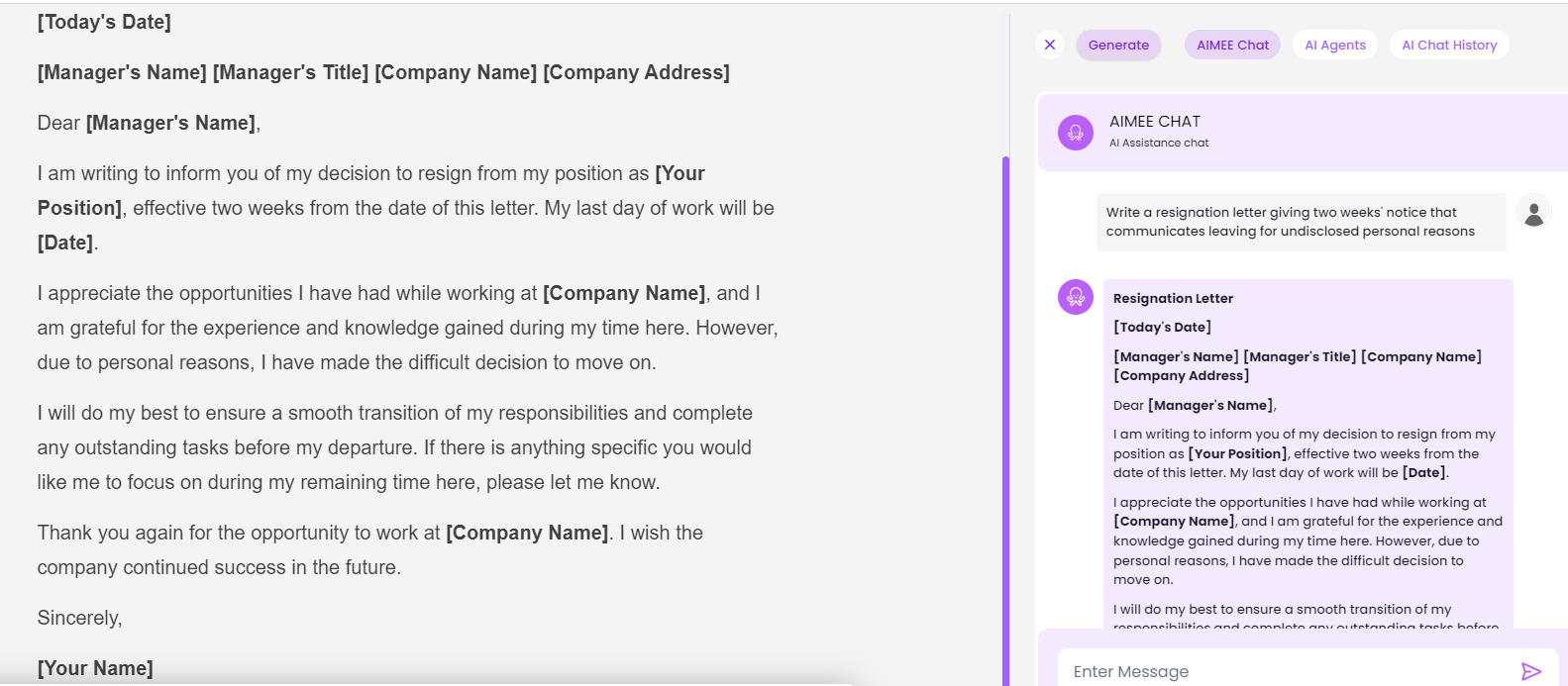
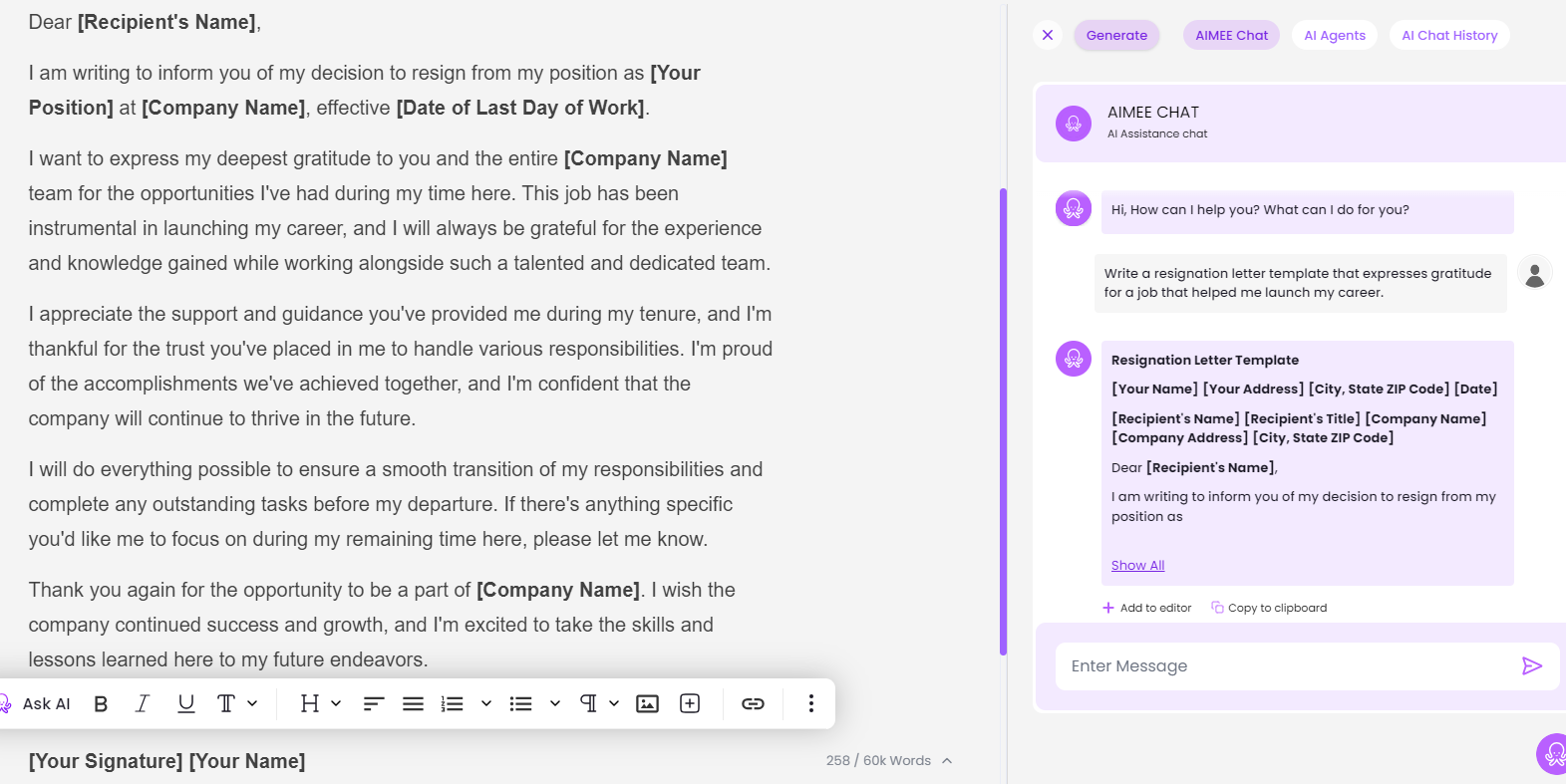
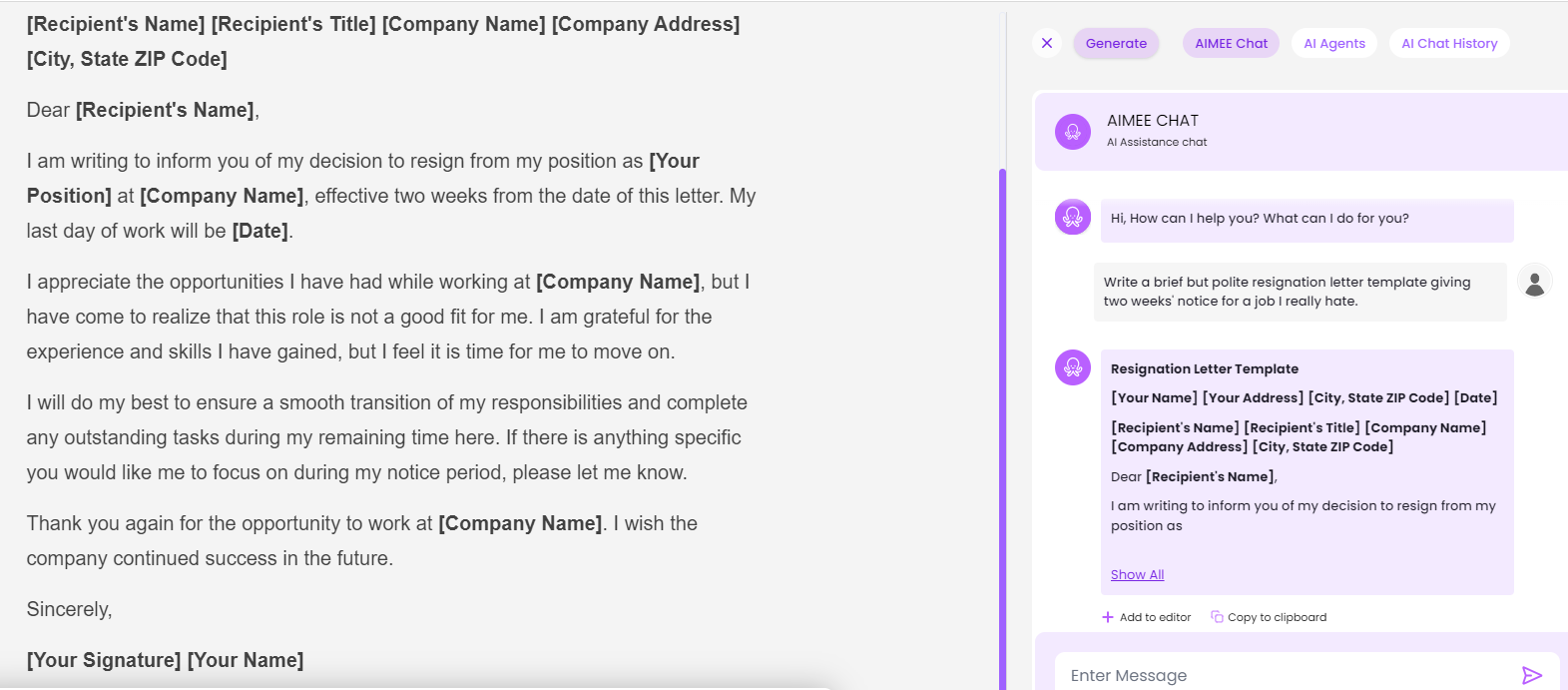
With a solid resignation letter template in hand, you’ll be well on your way to writing a professional, positive, and graceful resignation email. The goal is to maintain relationships and keep doors open for the future, even as you close this particular chapter in your career.
FAQs: How to Write a Resignation Email
How do you politely resign in an email?
Start with a clear email subject line and professional greeting. Thank your employer for the opportunity, state your resignation and notice period clearly, and offer help during the transition.
How do you write a basic resignation email?
Mention your intention to resign upfront. Include your last working day. Express thanks for the experience gained and offer assistance to ensure a smooth handover.
Is it okay to send a resignation letter by email?
Sending a resignation via email is acceptable, especially if company culture or circumstances make it hard to resign in person.
Conclusion
Writing a resignation email doesn’t have to be a stressful experience. By following these tips, you can craft a professional, graceful message that expresses your gratitude, provides adequate notice, and maintains positive relationships with your employer and colleagues.
It’s time to move on, but don’t leave without a parting gift — a well-written resignation email that showcases your thoughtfulness and consideration. It’s a courtesy to your colleagues and a classy way to exit.
